 W
WCai E (simplified Chinese: 蔡锷; traditional Chinese: 蔡鍔; pinyin: Cài È; Wade–Giles: Ts'ai4 O4; 18 December 1882 – 8 November 1916) was a Chinese revolutionary leader. He was born Cai Genyin (Chinese: 蔡艮寅; pinyin: Cài Gěnyín) in Shaoyang, Hunan, and his courtesy name was Songpo (Chinese: 松坡; pinyin: Sōngpō). Cai eventually became an influential warlord in Yunnan, and is best known for his role in challenging the imperial ambitions of Yuan Shikai during the anti-monarchy war.
 W
WChen Qimei was a Chinese revolutionary activist, close political ally of Sun Yat-sen, and early mentor of Chiang Kai-shek. He was as one of the founders of the Republic of China, and the uncle of Chen Guofu and Chen Lifu.
 W
WCheng Qian was a Chinese army officer and politician who held very important military and political positions in both the Republic of China and the People's Republic of China. Educated at the Imperial Japanese Army Academy and Waseda University, he first met Sun Yat-sen in Tokyo, becoming an early supporter. Later, under Chiang Kai-shek, he was one of the most powerful members of the Kuomintang, notably serving as Chief of Staff of the Military Affairs Commission during the Second Sino–Japanese War.
 W
WChiang Kai-shek, also known as Chiang Chung-cheng and romanized via Mandarin as Chiang Chieh-shih and Jiang Jieshi, was a Chinese Nationalist politician, revolutionary and military leader who served as the leader of the Republic of China between 1928 and 1975, first in mainland China until 1949 and then in Taiwan until his death.
 W
WDuan Qirui was a Chinese warlord and politician, a commander of the Beiyang Army and the acting Chief Executive of the Republic of China from 1924 to 1926. He was also the Premier of the Republic of China on four occasions between 1913 and 1918. He was arguably the most powerful man in China from 1916 to 1920.
 W
WEmpress Xiaodingjing, of the Manchu Bordered Yellow Banner Yehe Nara clan, personal name Jingfen, was a consort of the Guangxu Emperor. She was in a position of political authority during the minority of the Xuantong Emperor from 1908 until 1912; when, on behalf of the Emperor, she signed the letter of abdication, effectively ending two thousand years of imperial Chinese history.
 W
WFéng Guózhāng, was a Chinese general and politician in early republican China. He held the office of Vice-President and then President of the Republic of China. He is considered the founder of the Zhili Clique of Warlords that vied for control of northern China during the chaotic Warlord era.
 W
WFu Zuoyi was a Chinese military leader. He began his military career in the service of Yan Xishan, and he was widely praised for his defense of Suiyuan from the Japanese. During the final stages of the Chinese Civil War, Fu surrendered the large and strategic garrison around Beiping to Communist forces. He later served in the government of the People's Republic of China.
 W
WHe Chengjun was a Kuomintang politician and military officer of the Republic of China. He was born in Hubei. He was graduate of the Imperial Japanese Army Academy. As a member of the Tongmenghui, he took part in the Xinhai Revolution. He was briefly mayor of Beijing after its capture by the National Revolutionary Army during the Northern Expedition. In the Second Sino-Japanese War, he was governor of his home province and defended it against the advancing Imperial Japanese Army. After the defeat of the Kuomintang in the Chinese Civil War, he went to Hong Kong and in 1951 arrived in Taiwan. He died in Taipei at the age of 78.
 W
WHe Yingqin, also Ho Ying-chin, was a politician and one of the most senior generals of the Kuomintang (KMT) during Republic of China, and a close ally of Chiang Kai-shek.
 W
WHu Hanmin was one of the early conservative right factional leaders in the Kuomintang (KMT) during revolutionary China.
 W
WHuang Fu was a general and politician in early Republic of China.
 W
WHuang Xing or Huang Hsing was a Chinese revolutionary leader and politician, and the first commander-in-chief of the Republic of China. As one of the founders of the Kuomintang (KMT) and the Republic of China, his position was second only to Sun Yat-sen. Together they were known as Sun-Huang during the Xinhai Revolution. He was also known as the "Eight Fingered General" because of wounds sustained during war. His tomb is on Mount Yuelu, in Changsha, Hunan, China.
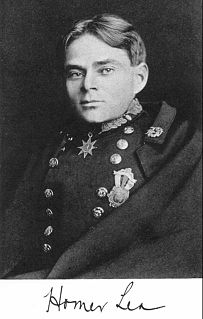 W
WHomer Lea was an American adventurer, author and geopolitical strategist. He is today best known for his involvement with Chinese reform and revolutionary movements in the early twentieth century and as a close advisor to Dr. Sun Yat-sen during the 1911 Chinese Republican revolution that overthrew the Qing Dynasty, and for his writings about China and geopolitics.
 W
WLi Liejun, was a Chinese revolutionary leader and general in the early Republic of China.
 W
WLi Yuanhong was a Chinese politician during the Qing dynasty and the Republic of China. He was the President of the Republic of China between 1916 and 1917, and between 1922 and 1923.
 W
WJohann Wilhelm Normann Munthe was a Norwegian military officer and art collector.
 W
WPan Dawei was a Chinese artist and political radical.
 W
WPuyi was the last Emperor of China as the eleventh and final Emperor of the Qing dynasty, China's last imperial dynasty. At the age of two, he was made the Xuantong Emperor in China and Khevt Yos Khaan in Mongolia from 1908 until his forced abdication on 12 February 1912, after the 1911 Revolution, though he would remain in the Forbidden Palace and continued a lavish lifestyle.
 W
WQiu Fengjia or Chiu Feng-Chia was a Taiwanese Hakka−Chinese patriot, educator, and poet.
 W
WQiu Jin was a Chinese revolutionary, feminist, and writer. Her courtesy names are Xuanqing and Jingxiong. Her sobriquet name is Jianhu Nüxia which, when translated literally into English, means "Woman Knight of Mirror Lake". Qiu was executed after a failed uprising against the Qing dynasty, and she is considered a national heroine in China; a martyr of republicanism and feminism.
 W
WShao Yuanchong was a founding member of the Xinhai Revolution and a politician of the Republic of China. He served as the vice president of the Legislative Yuan and the mayor of Hangchow and was one of the authors of the National Anthem of the Republic of China.
 W
WSong Jiaoren was a Chinese republican revolutionary, political leader and a founder of the Kuomintang (KMT). Song Jiaoren led the Kuomintang Party to electoral victories in China's first democratic election. He based his appeal on the upper class gentry, landowners, and merchants. Historians have concluded that provisional president, Yuan Shikai, was responsible for his assassination on March 20, 1913.
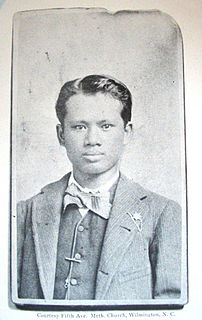 W
WCharles Jones Soong, courtesy name 耀如 Yàorú, hence his alternate name: Soong Yao-ju), was a Chinese businessman who first achieved prominence as a publisher in Shanghai. He was a close friend and follower of Sun Yat-sen through the Xinhai Revolution in 1911. His children became some of the most prominent figures in Republican China.
 W
WSun Yat-sen was a Chinese politician, physician, and political philosopher, who served as the provisional first president of the Republic of China and the first leader of the Kuomintang. He is referred as the "Father of the Nation" in the Republic of China for his instrumental role in the overthrow of the Qing dynasty during the Xinhai Revolution. Sun is unique among 20th-century Chinese leaders for being widely revered in both mainland China and Taiwan.
 W
WTaixu, was a Buddhist modernist, activist and thinker who advocated the reform and renewal of Chinese Buddhism.
 W
WTan Haoming was a member of the Old Guangxi Clique and military governor of Guangxi from April 1917 to July 1921. He was born on 13 July 1871 in Longzhou County, Guangxi province, China, and died on 17 April 1925. He was of Zhuang ethnicity.
 W
WTang Xiangming was a Chinese naval officer. Tang studied Naval warfare in France and the United Kingdom. In 1905, he joined the Chinese United League (Tongmenghui). In 1911, during the Wuchang Uprising, Tang, under the command of Admiral Sa Zhenbing, sailed to Hankou as part of the Qing Navy's assistance to the Qing Army operations in the area. In December 1915, he supported Yuan Shikai's creation of the Empire of China (1915–1916). After Yuan's death, he supported the Zhili clique until their defeat by the Fengtian clique in the Second Zhili–Fengtian War in 1924. In 1930, he supported Shanxi warlord Yan Xishan in opposing Chiang Kai-shek. In 1933, he became a member of the China Democratic Socialist Party. During the Second Sino-Japanese War, he went to Chongqing. After the end of the Chinese Civil War, he stayed on the mainland and died in Beijing at the age of 90. He was the younger brother of Tang Hualong.
 W
WTang Jiyao was a Chinese general and warlord of Yunnan during the Warlord Era of early Republican China. He was military governor of Yunnan from 1913-27.
 W
WTang Shaoyi, also spelled Tong Shao Yi, courtesy name Shaochuan (少川), was a Chinese statesman who briefly served as the first Premier of the Republic of China in 1912. In 1938, he was assassinated by the staff of the Bureau of Investigation and Statistics in Shanghai.
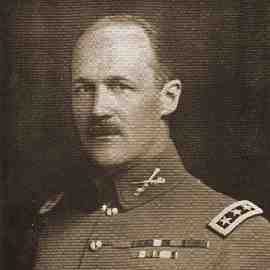 W
WIvor Thord-Gray was a Swedish-born adventurer, sailor, prison guard, soldier, government official, police officer, rubber plantation owner, ethnologist, linguist, investor, and author. He participated in thirteen wars spanning the continents of Africa, Asia, North America, and Europe.
 W
WWu Zhihui, also known as Woo Tsin-hang or Wu Shi-Fee, was a Chinese linguist and philosopher who was the chairman of the 1912–13 Commission on the Unification of Pronunciation that created Zhuyin and standardized Guoyu pronunciation.
 W
WXia Chao was the long-time police chief of Zhejiang Province during the Chinese Warlord Era (1916–1928), and also served as the province's civil governor from 1924 to 1926. He was among the most powerful political figures in Zhejiang throughout much of his career. In order to maintain and expand his influence over the province, Xia opportunistically played out different Chinese warlord factions against each other. Plotting to gain Zhejiang's independence from the warlord regime of Sun Chuanfang, Xia launched a rebellion in 1926, but was captured and summarily executed.
 W
WXu Zonghan is a hero of the Xinhai Revolution, which overthrew China's Qing Dynasty in 1911. She was a medical doctor and companion of the revolutionary general, Huang Xing.
 W
WYan Xishan IPA: [jɛ̌n ɕǐʂán]; 8 October 1883 – 22 July 1960, 閻錫山) was a Chinese warlord who served in the government of the Republic of China. He effectively controlled the province of Shanxi from the 1911 Xinhai Revolution to the 1949 Communist victory in the Chinese Civil War. As the leader of a relatively small, poor, remote province, he survived the machinations of Yuan Shikai, the Warlord Era, the Nationalist Era, the Japanese invasion of China and the subsequent civil war, being forced from office only when the Nationalist armies with which he was aligned had completely lost control of the Chinese mainland, isolating Shanxi from any source of economic or military supply. He has been viewed by Western biographers as a transitional figure who advocated using Western technology to protect Chinese traditions, while at the same time reforming older political, social and economic conditions in a way that paved the way for the radical changes that would occur after his rule.
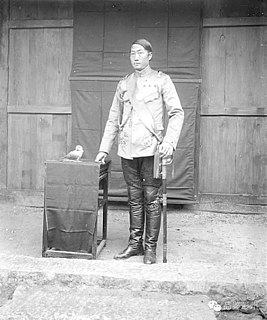 W
WYin Changheng was a military leader in the Qing Dynasty and the Republic of China. He was a member of the Tongmenghui, and on the outbreak of the Xinhai Revolution he became one of the leaders of the revolutionary army in Sichuan. He was the first Military Governor of Sichuan Province and one of the founders of the Sichuan Army. His former name was Changyi (昌儀). Courtesy name was Shuo Quan (碩権). He was born in Peng District, Sichuan.
 W
WYin Chang or In-ch'ang was a military official, ambassador to Germany, and educational reformer in the Qing Dynasty and the Republic of China. He was appointed the nation's first Minister of War in the late Qing Dynasty. Later, he also became the military Chief of Staff in the Beiyang Government. He was ethnic Manchu, and his family belonged to the Plain White Banner Clan of the Manchu Military Organization (滿洲正白旗); he held the title of Prince of that clan; at court he was addressed as Wu-lou.
 W
WYuan Shikai was a Chinese military and government official who rose to power during the late Qing dynasty, becoming the Emperor of the Empire of China (1915–1916). He tried to save the dynasty with a number of modernization projects including bureaucratic, fiscal, judicial, educational, and other reforms, despite playing a key part in the failure of the Hundred Days' Reform. He established the first modern army and a more efficient provincial government in North China in the last years of the Qing dynasty before the abdication of the Xuantong Emperor, the last monarch of the Qing dynasty, in 1912. Through negotiation, he became the first official president of the Republic of China in 1912. This army and bureaucratic control were the foundation of his autocratic rule as the first formal President of the Republic of China. He was frustrated in a short-lived attempt to restore hereditary monarchy in China, with himself as the Hongxian Emperor. His death shortly after his abdication formalized the fragmentation of the Chinese political system and the end of the Beiyang government as China's central authority.
 W
WZang Shiyi was a Chinese general and Governor of Liaoning Province at the time of the invasion of Manchuria in 1932.
 W
WZhang Binglin, also known as Zhang Taiyan, was a Chinese philologist, textual critic, philosopher, and revolutionary.
 W
WZhang Qun or Chang Ch'ün also known as Zhang Yuejun (張岳軍), was premier of the Republic of China and a prominent member of the Kuomintang. He served as secretary general to the President of the Republic from 1954 to 1972 and senior advisor to Presidents Chiang Kai-shek, Yen Chia-kan, Chiang Ching-kuo, and Lee Teng-hui. Under the influence of his wife, Ma Yu-ying, he became a Christian in the 1930s.
 W
WZhang Shaozeng was a Beiyang Army general in charge of the 20th Division.
 W
WZhao Hengti, was a general and warlord in Hunan during the Warlord Era of early Republic of China.
 W
WZhao Chengshou, courtesy name Yinfu (印甫), was a KMT general from Wutai County, Shanxi.
 W
WZhao Zhengping (1878–1945) was a politician of the Republic of China. He was born in Shanghai. As a member of the Tongmenghui, he participated in the Xinhai Revolution. In 1939, Zhao left Hong Kong to meet with Wang Jingwei. With the creation of Wang's government in March 1940, Zhao served as minister. After the downfall of Wang's government in August 1945, he committed suicide in Zhenhai District, Ningbo, Zhejiang after being charged with the crime of hanjian (treason).
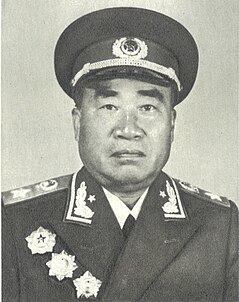 W
WZhu De was a Chinese general, warlord, politician, revolutionary of the Communist Party of China. Born poor in 1886 in Sichuan, he was adopted by a wealthy uncle at age nine. His wealthy uncle provided him a superior early education that led to his admission into a military academy. After the academy, he joined a rebel army and soon became a warlord. It was after this period that he adopted communism. He ascended through the ranks of the Chinese Red Army as it closed in on securing the nation. By the time China was under Mao's control, Zhu was a high-ranking official within the Communist Party of China. He served as commander-in-chief of the Eighth Route Army during the Second Sino-Japanese War. In 1955 he became one of the ten marshals of the People's Liberation Army, of which he is regarded as one of the principal founders. Zhu remained a prominent political figure until his death in 1976. As the chairman of the Standing Committee of the National People's Congress from 1975 to 1976, Zhu was the head of state of the People's Republic of China.
 W
WZou Rong was a Chinese nationalist, racialist and revolutionary martyr of the anti-Qing movement. He was born in Chongqing, Sichuan Province, his ancestors having moved there from Meizhou, Guangdong area. Zou was sent to Japan at an early age, where he studied the successful Japanese way of modernization.